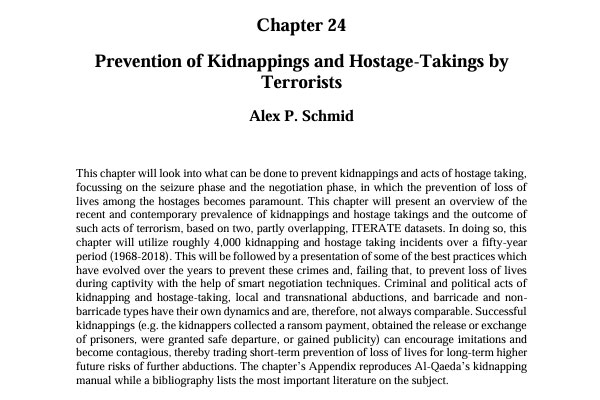ICCT Handbook on Transitional Justice & Organized Crime
Prevention of Kidnappings and Hostage-Takings by Terrorists - Alex P. Schmid.
This chapter will look into what can be done to prevent kidnappings and acts of hostage taking, focussing on the seizure phase and the negotiation phase, in which the prevention of loss of lives among the hostages becomes paramount. This chapter will present an overview of the recent and contemporary prevalence of kidnappings and hostage takings and the outcome of such acts of terrorism, based on two, partly overlapping, ITERATE datasets. In doing so, this chapter will utilize roughly 4,000 kidnapping and hostage taking incidents over a fifty-year period (1968-2018). This will be followed by a presentation of some of the best practices which have evolved over the years to prevent these crimes and, failing that, to prevent loss of lives during captivity with the help of smart negotiation techniques. Criminal and political acts of kidnapping and hostage-taking, local and transnational abductions, and barricade and non barricade types have their own dynamics and are, therefore, not always comparable. Successful kidnappings (e.g. the kidnappers collected a ransom payment, obtained the release or exchange of prisoners, were granted safe departure, or gained publicity) can encourage imitations and become contagious, thereby trading short-term prevention of loss of lives for long-term higher future risks of further abductions. The chapter’s Appendix reproduces Al-Qaeda’s kidnapping manual while a bibliography lists the most important literature on the subject.
Source: https://icct.nl/sites/default/files/2023-01/Chapter-24-Handbook-.pdf
